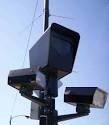 In a follow-up on a
previous post, the nation's sixth-largest county has banned red-light cameras.
In a follow-up on a
previous post, the nation's sixth-largest county has banned red-light cameras.
For the County Supervisors in Orange County, the main issue was the potential for unlawful information-gathering. Supervisor Todd Spitzer called the devices "a real intrusion into our private lives." Mr. Spitzer added that there was "clear public sentiment that these things need to go."
Although they are still used in many areas, red-light cameras are not as popular as they once were, not only due to public backlash but also because of rising costs associated with the cameras.
You can dispute that red-light cameras reduce intersection collisions. The cameras also create revenue, which presumably means lower taxes and more money for basic state services like road and bridge repair. Again, the amount varies, but most governments get about a fourth of the gross revenue from red-light camera tickets while spending very little money on oversight.
In short, there are several reasons why proponents are in favor of keeping red-light cameras in place in Kern County, but there are some strong arguments on the other side as well.
There is no option for a police officer to issue a warning in those situations where that action may be appropriate. Red-light cameras also increase rear-end collisions by an average of 15 percent. And, although the California Supreme Court has ruled that red-light camera tickets are legal, questions continue to arise. There's also the contention that these devices are just a moneymaking scam. In 2013, an Ohio judge called red-light cameras " a high-tech game of 3-Card Monty."
If you receive a traffic ticket, contact me today about what we can do to help you keep your record clean and your costs low.
